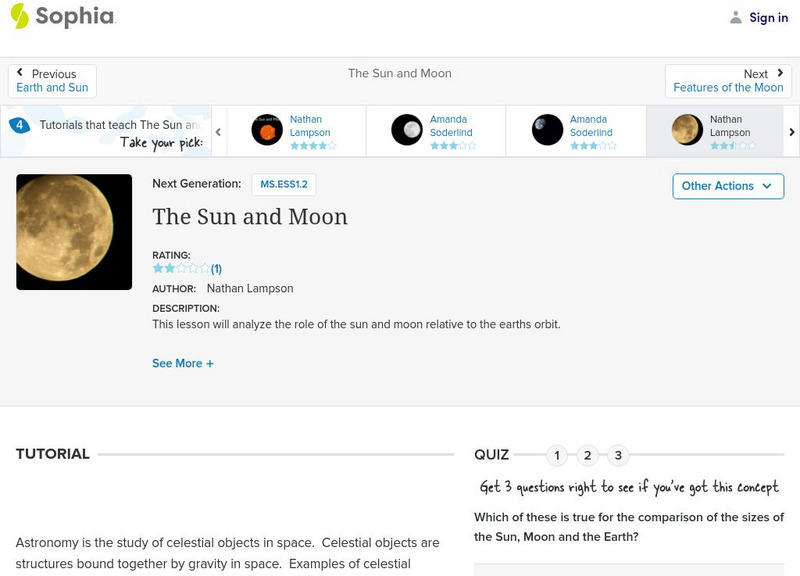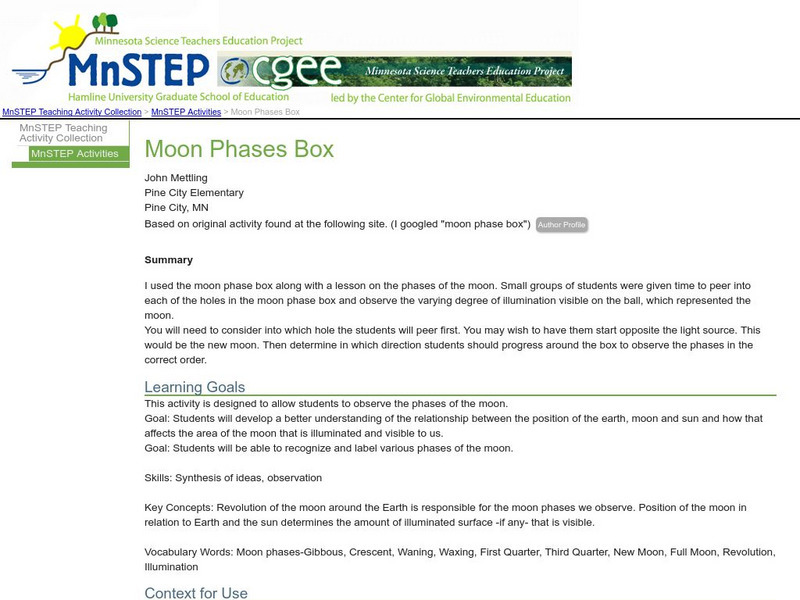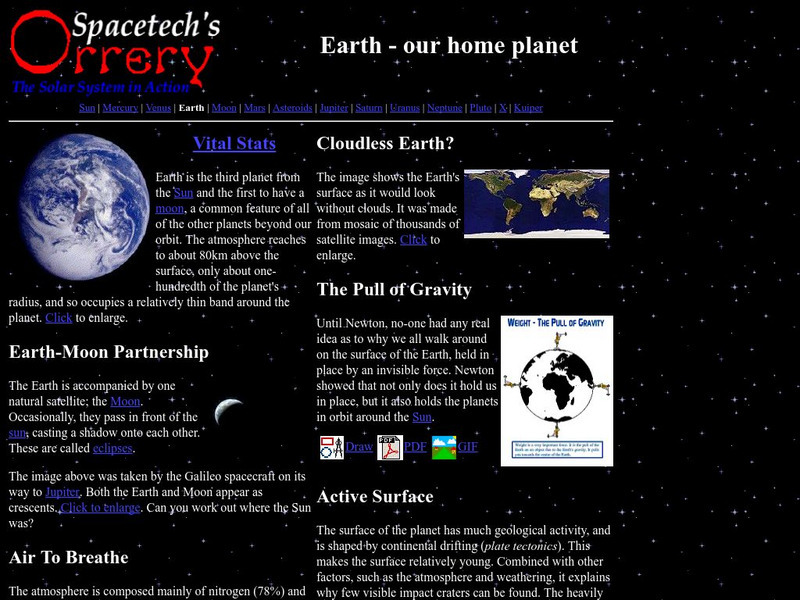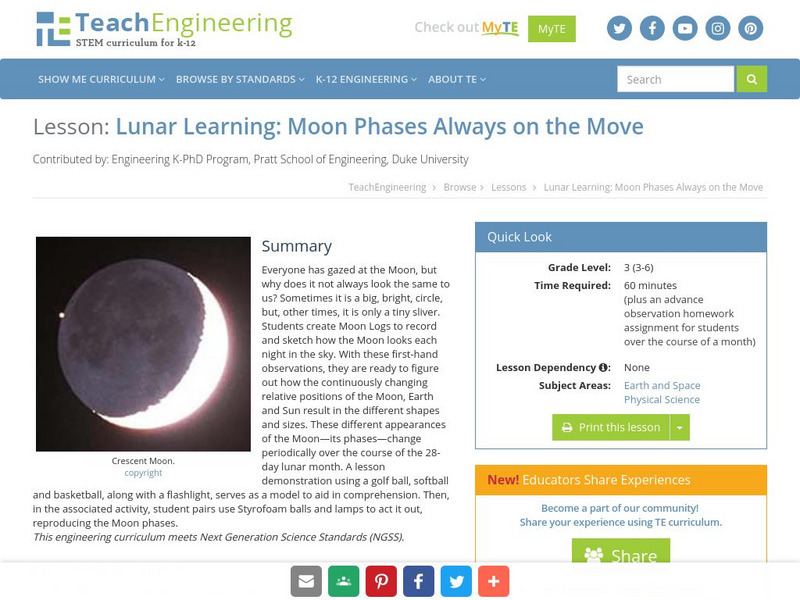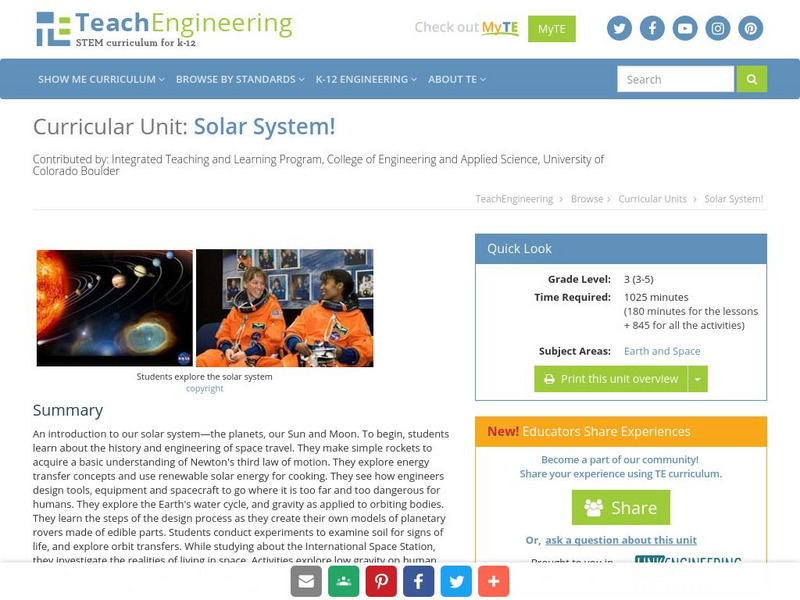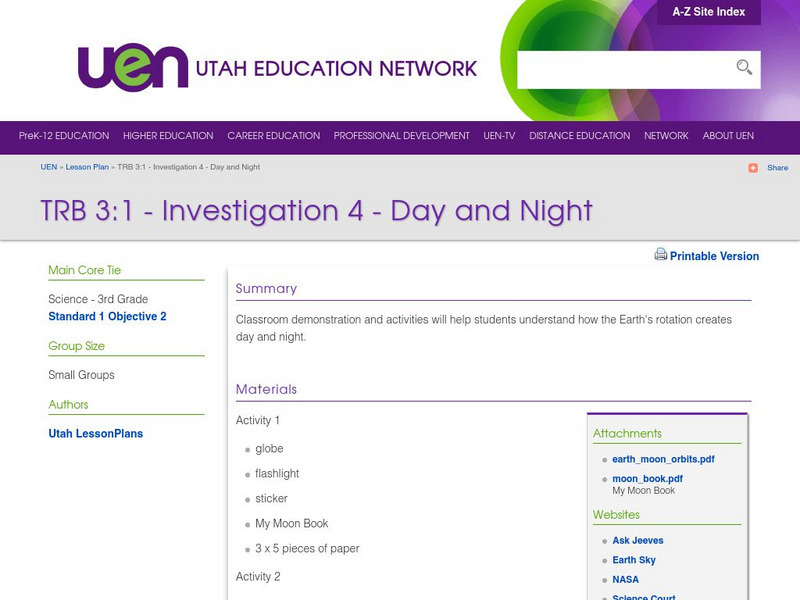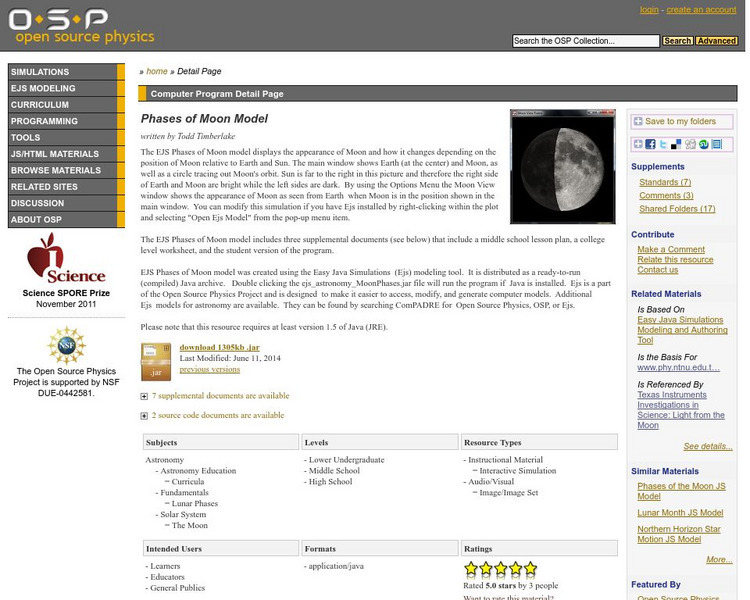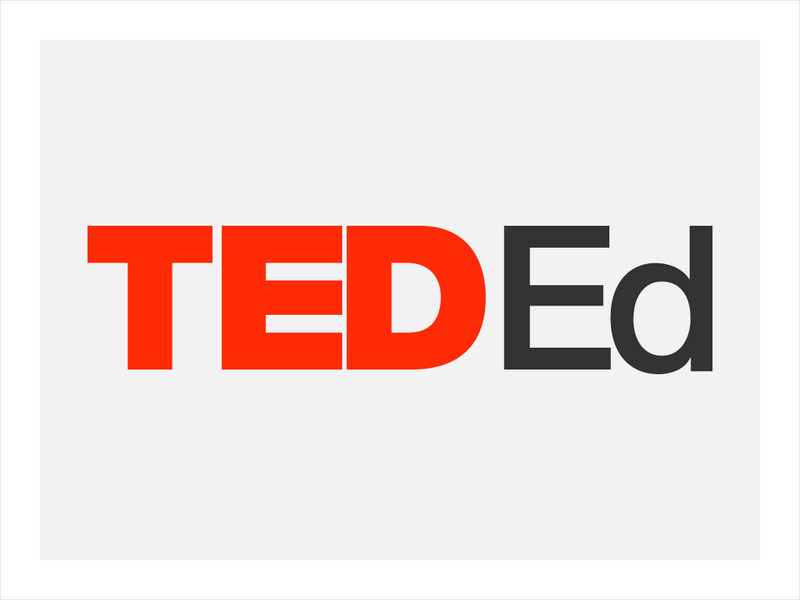Hi, what do you want to do?
BBC
Bb Ci Space: Earth
The BBC provides a general overview of the planet Earth. Content includes statistical information, a focus on the four seasons, moon information, and more.
ClassFlow
Class Flow: Earth, Sun and Moon
[Free Registration/Login Required] In this unit children learn about the shapes and relative sizes of the Earth, Sun and Moon. Using models they learn how the three bodies move relative to each other and how these movements relate to...
Sophia Learning
Sophia: The Sun and Moon: Lesson 3
This lesson will analyze the role of the sun and moon relative to the earth's orbit. It is 3 of 4 in the series titled "The Sun and Moon."
Sophia Learning
Sophia: The Sun and Moon: Lesson 4
This lesson will analyze the role of the sun and moon relative to the earth's orbit. It is 4 of 4 in the series titled "The Sun and Moon."
The Wonder of Science
The Wonder of Science: Ms Ess1 1: Earth Sun Moon System
Develop and use a model of the earth-sun-moon system to describe the cyclic patterns of lunar phases, eclipses of the sun and moon, and seasons.
CK-12 Foundation
Ck 12: Physics Simulation: Phases of the Moon
[Free Registration/Login Required] Learn how the steady motion of the Moon around the Earth, and the phases created by the relative position of the Earth, Sun, and Moon, allow us to tell time by simply looking at the shape and...
CK-12 Foundation
Ck 12: Earth Science: Tides
[Free Registration/Login may be required to access all resource tools.] Reveals tidal patterns and that tides are caused by the gravitational attraction of the Sun and Moon to Earth.
University of Colorado
University of Colorado: Ph Et Interactive Simulations: Gravity and Orbits
An interactive simulation that teaches about gravitational force, circular motion, and astronomy by manipulating the sun, earth, moon, and a space station to observe the effects of gravity and orbital paths. This simulation can either be...
University of Colorado
University of Colorado: Ph Et Interactive Simulations: Gravity and Orbits
Move the sun, earth, moon, and space station to see how it affects their gravitational forces and orbital paths. Visualize the sizes and distances between different heavenly bodies, and turn off gravity to see what would happen without it.
Science Education Resource Center at Carleton College
Serc: Moon Phases Box
This activity is designed to allow learners to observe and recognize the phases of the moon. They will develop a better understanding of the relationship between the position of the earth, moon and sun and how that affects the area of...
Other
Spacetech's Orrery: Earth Our Home Planet
This site provides a very interesting overview of our home planet, Earth. Content includes a focus on the atmosphere, the pull of gravity, and the active surface.
Alabama Learning Exchange
Alex: Sun, Earth, and Moon: Calendar of Events
During this lesson students are going to take a look at moon phases and sunrise-sunset times in order to learn about daylight hours. Students discover that we do not always have the same amount of daylight each day. This lesson is best...
Utah Education Network
Uen: Earth and Moon Observations
Earth's revolution, rotation, tilt, day and night cycle, and the sun's apparent movement across the earth are explored.
TeachEngineering
Teach Engineering: Lunar Learning
Why does the Moon not always look the same to us? Sometimes it is a big, bright, circle, but, other times, it is only a tiny sliver, if we can see it at all. The different shapes and sizes of the slivers of the Moon are referred to as...
Better Lesson
Better Lesson: Our Sky
What objects are in the day sky and the night sky? How do they seem to move? Come and explore with us as we discover the sun, moon, planets and stars! This detailed lesson plan includes pictures and videos of the instructional activity...
NASA
Nasa Space Science Data Archive: Ice on Europa
With the exception of Earth, Europa currently appears to be the only body in the solar system which potentially harbors a global ocean of liquid water. The possibility of liquid water raises the possibility of life, as well. This NASA...
TeachEngineering
Teach Engineering: Solar System!
An introduction to our solar system: the planets, our Sun and our Moon. Students begin by learning the history and engineering of space travel. They make simple rockets to acquire a basic understanding Newton's third law of motion. They...
Utah Education Network
Uen: Trb 3:1: Investigation 4: Day and Night
A lesson for third graders in which they learn about the rotation of the Earth on its axis and how this movement creates day and night. They also examine the orbit of the moon about the Earth and the Earth's orbit around the sun.
CK-12 Foundation
Ck 12: Fifth Grade Science: Earth Science: The Sun Earth Moon System
[Free Registration/Login may be required to access all resource tools.] Discusses solar and lunar eclipses, the phases of the Moon, and why the phases occur.
Fourmilab Switzerland
Earth and Moon Viewer
View a map of the Earth showing the day and night regions at this moment, or from the sun, the noon, the night side, and other points of view in this simulation. Illustrated.
Project Britain
Primary Homework Help: Earth and Space Quiz
This resource provides information about Earth and space. In addition, there is a quiz provided.
American Association of Physics Teachers
Com Padre Digital Library: Open Source Physics: Phases of the Moon Model
Examine the changes that occur with the moon's movement in relationship to the Earth and Sun with this astronomy simulation.
TED Talks
Ted: Ted Ed: A Rare, Spectacular Total Eclipse of the Sun
Andy Cohen details the extraordinary celestial phenomenon of a total solar eclipse, and when it will next occur. [3:47]
Enchanted Learning
Enchanted Learning: Zoom Astronomy: All About Space
A fantastic collection of information about the solar system. Includes information on all of the planets, the moon, the sun, asteroids, comets, meteoroids, and stars. Also find puzzles, a dictionary, quizzes, classroom activities, and...
Other popular searches
- Earth Sun and Moon
- Earth, Sun and Moon
- Earth and Moon and Sun
- Sun, Earth and Moon
- Earth, Moon, and Sun
- Moon Earth and Sun Rotations
- Earth, Sun, and Moon







